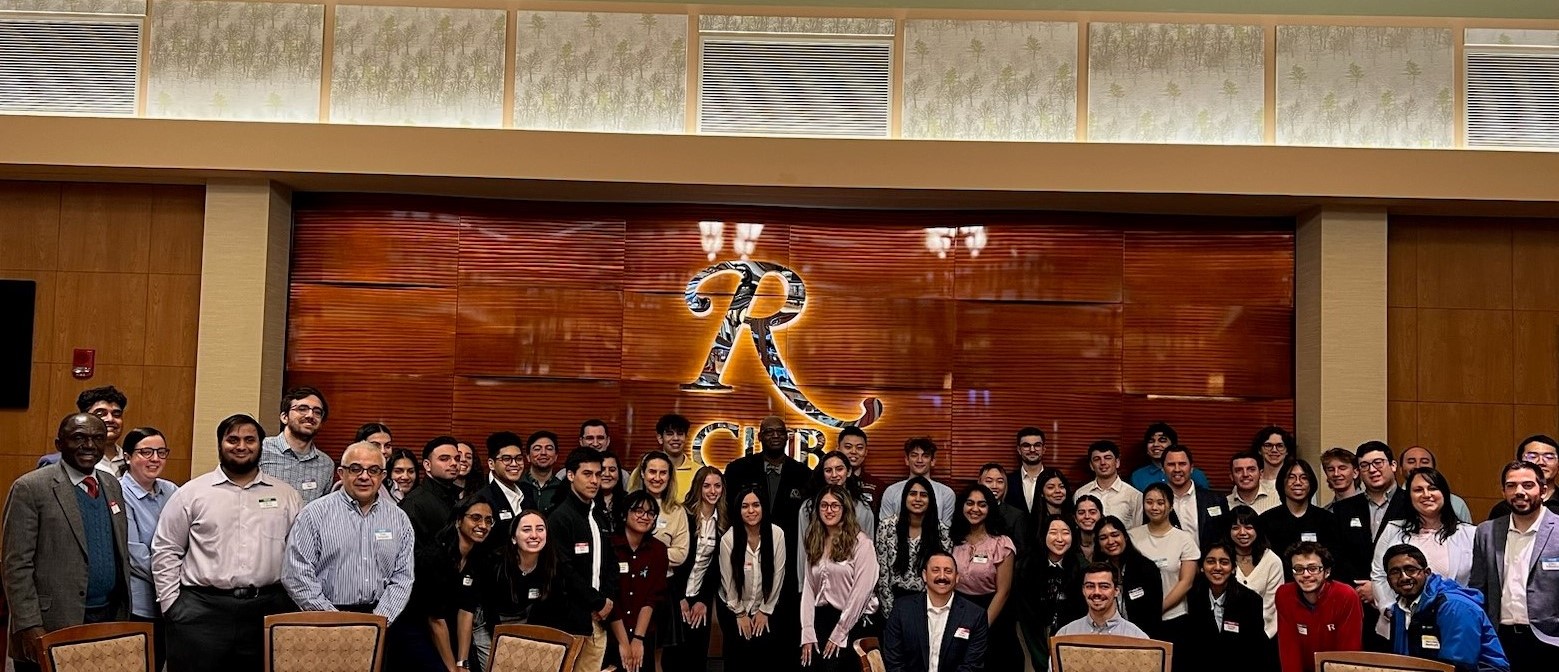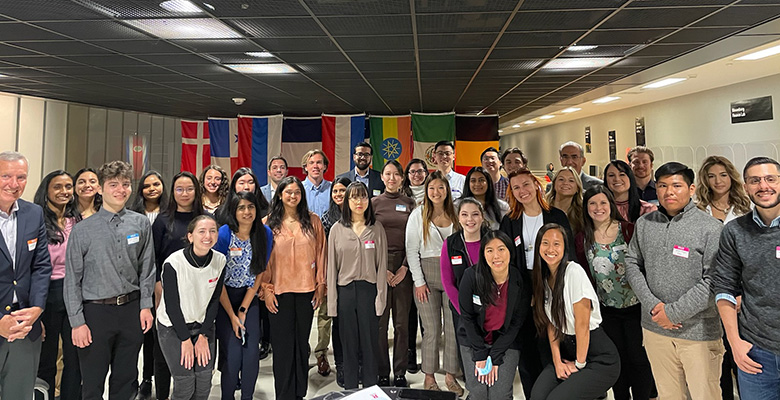Join the New Brunswick Road to CPA mailing list
Please note - all undergraduate accounting majors already receive all Road to CPA communications - no need to sign up here again. This list is for students interested in accounting who have not declared a major yet or accounting graduate students.
Road to CPA - New Brunswick is an all-inclusive program created to provide guidance and support to students on their path to CPA licensure and a meaningful accounting career. Resources are readily available to all interested accounting majors - the Road to CPA objective is to assist any accounting students who need help in achieving their goals.
Program Highlights:
- CPA-Level Financial Accounting and Reporting Course: Open to students who have completed Intermediate Accounting II, this course is a review for the FAR section of the CPA Exam - offering students the benefits of an instructor and in-class discussion as they prepare. The course includes exposure to material not previously covered in other classes, integration of familiar material for a new way of analyzing these topics, and a discussion of skills and techniques necessary for passing the exam.
- Academic Advising: Support is available to assist students in planning class schedules and making decisions about the best ways to meet the 150 credit-hour requirement. See the Frequently Asked Questions section below for some more information.
- Assistance Navigating Requirements for the CPA Exam and Licensure: Not sure where to start? Your journey begins with information! See below for some helpful resources on the CPA Exam and licensure.
- Career Information and Guidance: The accounting profession offers many exciting and fulfilling career options - which one is right for you? A variety of seminars and information sessions held throughout the semester will help students evaluate which career paths might interest them. See the calendar of events below. See the Frequently Asked Questions section below for some more information.
If you need guidance or advice related to your accounting courses, the CPA Exam or license, or accounting careers - please reach out to Sarah O'Rourke at slilley@business.rutgers.edu for assistance. Note: If you need advice related to general academic requirements for graduation - you should reach out to your RBS academic advisor.
Road to CPA Events
Road to CPA Events are now all listed on Suitable! If you aren't familiar, go to https://myrbs.business.rutgers.edu/students/real-program and scroll to the bottom of the page for instructions on How to use the REAL platform. Earn REAL points for every Road to CPA event!
Just look for events tagged "Road to CPA."
Download the Suitable App
Apple App Store
Google Play
Introducing the Road to CPA Mentoring Program:
Road to CPA offers a mentoring program for our undergraduate accounting students (or students considering accounting as a major) where they are matched with professionals in various accounting industries. Many of our mentors are recent RBS grads!
The Road to CPA Mentoring program is accepting new mentees into the program for the 2025-2026 school year. All mentoring tasks will be tracked in Suitable - you will set goals and meet with your mentor about once per month (typically via Zoom, Webex, etc.) through April, and we'll have several (optional) in-person networking events (we'll cover these tasks in an orientation before the program begins).
Please sign up by Thursday, 10/2.




Learn more about the Road to CPA FAR review course: CPA-Level Financial Accounting and Reporting:
This 3-credit course (29:010:475) is designed to help you prepare for the FAR section of the CPA exam. The course is available to students in both New Brunswick and Newark, and will usually count as business credits (not accounting credits) in most states (such as New Jersey and New York).
This course is designed to help you develop good study habits which will start you on a path to success as you begin your CPA journey. FAR is a good section to begin with on the new 2024 exam, because it lays the foundation for many of the other sections. Some students will do well preparing for the exam with self-study - but for those students looking for the structure and guidance of an instructor and regular class meetings - please consider this in-person review course!
Note: CPA-Level Financial Accounting and Reporting is currently offered during the spring semester.
If you have any questions about the course, please reach out to Sarah O'Rourke at slilley@business.rutgers.edu.
Road to CPA – Your Journey Begins with Information
Not sure where to start with the CPA Exam?
Requirements vary by state – so first, consider which state you may want to become licensed in:
If you are considering a CPA license in New Jersey, please refer to the following links:
- New Jersey Society of Certified Public Accountants (NJCPA) website
- New Jersey State Board of Accountancy website
If you are considering a CPA license in New York, please refer to the following links:
If you are considering a CPA license in Pennsylvania, please refer to the following links:
- The Pennsylvania Institute of Certified Public Accountants (PICPA) website
- Pennsylvania State Board of Accountancy website
If you are considering another state or just want general information, you can find helpful information from the following links
(the NASBA site has links to all State Board of Accountancy websites):
- American Institute of Certified Public Accounts (AICPA)
- National Association of State Boards of Accountancy (NASBA)
If you are looking for detailed information about the layout of the CPA Exam as well as the specific subject matter tested, please see the AICPA's CPA Exam Blueprints (the download links are toward the bottom of the page).
If you are ready to register to sit for the CPA Exam, get started at NASBA's CPA Exam site. Begin the process by creating an account. The site also contains many helpful links and information.
Frequently Asked Questions
What is the best pathway to earning the 150 credit-hours necessary for CPA licensure? Should I obtain a Master's degree? Or should I complete the 150 credit-hours at the undergraduate level as part of a double major or even just taking random courses?
It really depends on your individual interests and career goals. If you have an interest in a second major, such as Supply Chain or Finance, and wish to find a job later down the road incorporating both accounting and that other field, perhaps a double-major is appealing. If down the road, you could see yourself becoming an educator, a Master’s degree may be an attractive option.
The CPA license requirements do not include a Master’s degree. However, every student needs to decide which path is best for them. One additional year of education is a drop in the bucket of a 40+ year career. We encourage you to make the most of your education by pursuing a path that aligns with your interests and maximizes your career potential. Our faculty and advisors are here to help you.
If you are curious as to whether a Master’s degree, double major or random courses will affect how you are viewed by recruiters of accounting firms or other companies, we (Professors) have not observed one option being favored over another option. You may want to consult with the Office of Career Management.
I am a transfer student. Do my classes from a community college count towards the 150 required credit-hours?
Yes, credits from any accredited community college count. However, classes cannot be double-counted. For example, if you took Introduction to Financial Accounting at a community college and then retook it at Rutgers Business School, that class can only be counted once toward the 150 required credit-hours. Students should contact the relevant state board of accountancy with questions about requirements: https://nasba.org/stateboards/.
Do assessment credits such as Advanced Placement (AP) credits count towards the 150 required credit-hours?
Assessment credits are college credits earned for taking examinations. In general, most states do accept these credits towards the 150 required credit-hours, but it's very important you check with the state you plan to become licensed in. In general, as long as you have received credit on a college transcript, the credits should qualify. You may also have to submit official high school records. However, some states may only accept certain types of credits or no credits at all - so you must verify what is acceptable for your specific state.
Do I need my CPA license to succeed?
Not necessarily. A CPA license is, of course, needed to succeed in public accounting. And, more generally, it increases the career options available to you. A CPA license is a well-respected and desired credential – it signals a certain level of knowledge and professionalism above that of a basic accountant. In terms of financial rewards, many firms reward recent hires with bonuses upon passing the CPA Exam. In addition, many firms require or prefer experienced job applicants to have a CPA license, even if such a license is not required for a particular job.
On paper alone, if an employer is deciding between a candidate with or without a CPA, they will more than likely choose the CPA. However, if you are able to get your foot in the door of a great company, and you work hard, and show you are a great team player, that in itself can contribute to future promotions and success. There are many successful people in the industry who do not have a CPA license.
Are the requirements for the CPA Exam and CPA licensure the same in every state?
No. There are 55 U.S. jurisdictions that each maintain their own requirements with respect to the CPA license. See the NASBA website for more information: https://nasba.org/stateboards/. Also, see specific information above for New Jersey, New York and Pennsylvania requirements.
As an accounting major, what are the different career paths available to me?
There are many opportunities available to accounting majors. Broadly speaking, the career paths span public accounting firms, corporations, and governments and nonprofit entities. Within each broad career path, professionals can further focus on auditing (internal or external), financial accounting and reporting, tax, financial planning and analysis, among other positions. The majority of students tend to launch their careers in public accounting, but this is not the only path.
Rutgers Business School has significant relationships with the Big 4 as well as numerous mid-size and regional firms including Marcum, CBIZ, EisnerAmper, Withum, Wiss, WilkinGuttenplan, Crowe, Citrin Cooperman, BakerTilly, Grant Thornton, RSM, CohnReznick and Untracht Early. Additionally, Rutgers Business School has strong recruiting ties with corporations looking for accounting students such as Prudential, Johnson & Johnson and Bristol Myers Squibb, to name a few.
For more information, visit the Office of Career Management website:
Or email the Office of Career Management at: RBScareers@business.rutgers.edu.
You can also find more general career information on the Rutgers Business School pages for accounting majors:
Do I have to start in public accounting?
Not necessarily. It has traditionally been said that public accounting is the ideal “steppingstone” towards future career opportunities. However, public accounting is not the right path for everyone, and it is possible to start and have a long and gratifying career at a corporation, government, or nonprofit. For new graduates, many private companies now present management-training or rotational programs that offer competitive salaries. Once you get through the door of any private company, hard work can help you advance up the ranks.
That being said, many past students have led rewarding careers in public accounting and have found public accounting to be a valuable starting point for other opportunities.
It may also be generally easier to move from public accounting to other opportunities than it is to move into public accounting from other opportunities. This is another situation where, on paper alone, a candidate with public accounting experience may appear more attractive than one without. However, the environment of public accounting is not for everyone. It is a field renowned for late hours and abundant overtime. Many new graduates wish for an easier work/life balance. At the same time, a job in private accounting is certainly not stress-free, and many accounting firms have worked to address employee concerns with work/life balance issues. In general, as you climb up the ladder at any company, more responsibilities may require more time at work.
If I do begin my career in public accounting, should I focus only on the Big 4 firms?
No. There are other accounting firms of various sizes that can offer you a start to your career in accounting. The Big 4 may service larger clients, but there are other accounting firms that provide the same services as a Big 4 firm and offer very rewarding careers. Firms of different sizes provide different benefits to employees - you should consider the environment that feels like the best fit for you.
What is internal audit and how can I find out more about this career path?
Internal audit is a lesser-known career path that may be a great fit for some accounting majors. See the IIA Student Night Presentation from our April 2021 event and IIA Student Brochure provided by the Institute of Internal Auditors for more information.
What is LinkedIn Learning and how can I use it to improve my skills in areas such as Excel, Tableau, or other applications?
Rutgers and LinkedIn Learning (formerly Lynda.com) have an agreement that provides FREE access to over 14,000 online courses for all students!
Whether you want to brush up on your skills, develop a new hobby, or practice for certification tests, these courses are available anytime, accessible via both PC and mobile devices.
A sample of courses available through the platform include Advanced Excel, Adobe Suite, Python, Tableau, Diversity Training, and so many more. With LinkedIn Learning, you can develop the co-curricular skills you need to advance your career with personalized course recommendations based on your interests, experience, and skills. You can also earn skill badges and certificates to display on your LinkedIn page.
Have a question that you don’t see answered here? What other information would be useful to you? Please reach out to Sarah O’Rourke at slilley@business.rutgers.edu with questions or comments.
Follow us on LinkedIn!
